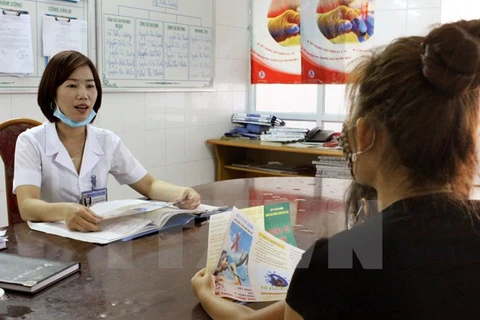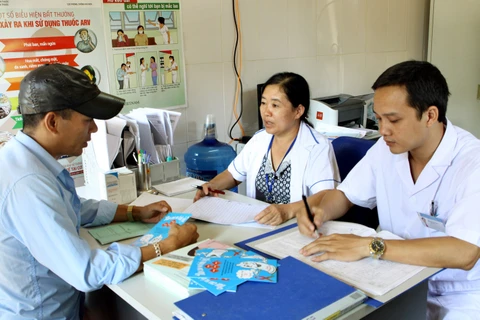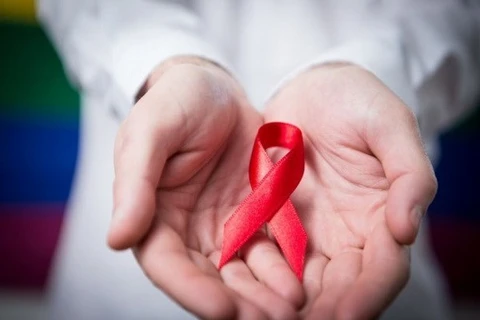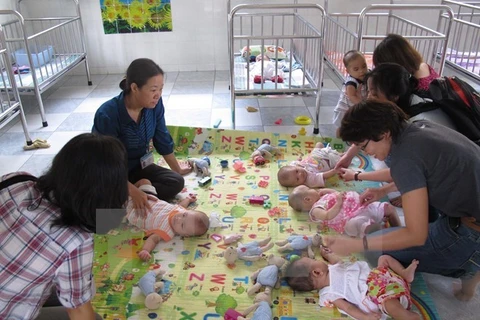HCM City (VNA/VNS) - N.C.T, a 32-year-old man, and his partner, a 38-year-old man, are waiting at the District 11 Preventive Medicine Centre to receive free antiretroviral drugs.
With international support, ARV treatment has been made available free of charge in Vietnam.
But from next year, the two men will no longer enjoy free medicines and treatment, and health insurance cards will be the lifebuoy for HIV patients like them.
They live together in a rented house in Binh Tan district, but have been coming to the centre for HIV treatment for the past three years for fear of being seen in their neighbourhood waiting in a queue to pick up medication for HIV.
But since social stigma and discrimination remain widespread in the country, most insured people living with HIV are unwilling to use their health insurance cards for fear of revealing their infection status.
“My company buys a health insurance card for me,” N.C.T said.
“The company might discover my HIV infection if I register for treatment using the health insurance card.”
According to Bui Thi Tu Anh, deputy head of the centre’s public health consulting and support department, the concern about disclosure of their HIV infection status is very common among patients.
Around 2,000 people are being treated at the department, with 74 percent having insurance.
“Many patients are teachers, students, State officials, managers and senior workers in large companies, and all of them have health insurance. But they refuse to use the insurance for HIV treatment due to the fear of leaking their infection status.”
Many patients want to buy additional health insurance to exclusively use for their HIV treatment, but one person is allowed to get only one health insurance card.
As international donors are phasing out assistance for HIV/AIDS control in Vietnam, patients have to pay for health checks, regular tests and ARV treatment next year if they do not have national health insurance.
With donors phasing out assistance, social health insurance for people living with HIV will become vital to sustain the delivery of HIV treatment services.
Between 2008 and 2013, HCM City received international support for HIV/AIDS prevention and treatment from long-term sponsors such as the U.S. President’s Emergency Plan for AIDS Relief (PEPFAR), the Asian Development Bank, the World Bank, and the Clinton Foundation.
PEPFAR’s aid accounted for 80-85 percent of the city’s financial resources to combat HIV/AIDS, Tieu Thi Thu Van, Director of the HCM City HIV/AIDS Prevention Centre, said.
"International financial support has been decreasing since 2011 and is expected to dry up in the next two years," she said.
Funding from the central budget falls short of the need, plunging from nearly 7.9 billion VND (349,550 USD) in 2012 to just 1.7 billion VND (75,220 USD) in 2014.
In 2016-20 there is not a single national programme for HIV/AIDS prevention and control.
HIV/AIDS work in the city is estimated to require more than 2.8 trillion VND (123.89 million USD) in 2014-20.
But only 2.22 trillion VND (98.23 million USD) is likely to be mobilised, resulting in a shortage of nearly 579 billion VND, according to Van.
HCM City has nearly 30,000 people living with HIV, 70 percent of whom were covered by health insurance, according to statistics from the HCM City HIV/AIDS Prevention Centre.
"The city government targets bringing everyone living with HIV into the health insurance net next year," Duong Minh Hai, head of the centre’s care and treatment department, said.
To achieve the target, the People’s Committee has approved use of the surplus in the health insurance fund last year to buy health insurance cards for disadvantaged HIV patients who cannot afford them.
However, there are nearly 1,000 HIV patients without identity documents such as identity cards, household registration books and residence cards or in jail.
“Insured HIV patients without identity documents are ineligible for health insurance as patients are required to furnish identity documents,” Hai said
“This is the greatest challenge yet to be addressed.”
Kim Chi Na, head of the District 11 Preventive Medicine Centre’s public health consulting and support department, said for people living with HIV, ARV had been a life-saver.
Those who do not stick to the ARV regimen prescribed by their doctors might become resistant to the drugs.
Resistance increases the risk that the virus will mutate and produce drug-resistant HIV.
Patients without identity documents would not be able to adhere to their treatment regime due to a lack of financial support, increasing risk of HIV drug resistance, she said.
To address this problem, the HCM City HIV/AIDS Prevention Centre plans to work with the municipal Public Security Agency to set up a team dedicated to study specific cases and help such patients get identity documents.
Since November 2015, the Ministry of Health has ordered local health departments to make payments for the treatment of insured HIV patients as well as expand insurance coverage for people living with HIV.
The city has 46 outpatient clinics that provide ARV treatment, according to the HCM City HIV/AIDS Prevention Centre.
Outpatient clinics at the HCM City Hospital for Tropical Diseases, Pham Ngoc Thach Hospital, and Paediatrics Hospital No.1 and No.2 have provided health checks and treatment for HIV patients with insurance.
Bui Duc Duong, Deputy Director of the Vietnam Administration of HIV/AIDS Control, said with the current limited resources it was essential for everyone with HIV to sign up for the health insurance scheme.
The administration would mobilise all resources and create favorable conditions for people with HIV to be covered by health insurance and help them comply with the ARV regime at any cost, he said.
The Vietnamese Government targets bringing 100 percent of people with HIV into the health insurance net by 2020.
It targets the 90-90-90 goal by 2020, which refers to 90 percent of all people living with HIV knowing their HIV status, 90 percent of all people diagnosed with HIV getting sustained antiretroviral therapy, and 90 percent of all people receiving the therapy having viral suppression.
By the end of last January, the country had 116,000 people with HIV getting ARV treatment.-VNA
With international support, ARV treatment has been made available free of charge in Vietnam.
But from next year, the two men will no longer enjoy free medicines and treatment, and health insurance cards will be the lifebuoy for HIV patients like them.
They live together in a rented house in Binh Tan district, but have been coming to the centre for HIV treatment for the past three years for fear of being seen in their neighbourhood waiting in a queue to pick up medication for HIV.
But since social stigma and discrimination remain widespread in the country, most insured people living with HIV are unwilling to use their health insurance cards for fear of revealing their infection status.
“My company buys a health insurance card for me,” N.C.T said.
“The company might discover my HIV infection if I register for treatment using the health insurance card.”
According to Bui Thi Tu Anh, deputy head of the centre’s public health consulting and support department, the concern about disclosure of their HIV infection status is very common among patients.
Around 2,000 people are being treated at the department, with 74 percent having insurance.
“Many patients are teachers, students, State officials, managers and senior workers in large companies, and all of them have health insurance. But they refuse to use the insurance for HIV treatment due to the fear of leaking their infection status.”
Many patients want to buy additional health insurance to exclusively use for their HIV treatment, but one person is allowed to get only one health insurance card.
As international donors are phasing out assistance for HIV/AIDS control in Vietnam, patients have to pay for health checks, regular tests and ARV treatment next year if they do not have national health insurance.
With donors phasing out assistance, social health insurance for people living with HIV will become vital to sustain the delivery of HIV treatment services.
Between 2008 and 2013, HCM City received international support for HIV/AIDS prevention and treatment from long-term sponsors such as the U.S. President’s Emergency Plan for AIDS Relief (PEPFAR), the Asian Development Bank, the World Bank, and the Clinton Foundation.
PEPFAR’s aid accounted for 80-85 percent of the city’s financial resources to combat HIV/AIDS, Tieu Thi Thu Van, Director of the HCM City HIV/AIDS Prevention Centre, said.
"International financial support has been decreasing since 2011 and is expected to dry up in the next two years," she said.
Funding from the central budget falls short of the need, plunging from nearly 7.9 billion VND (349,550 USD) in 2012 to just 1.7 billion VND (75,220 USD) in 2014.
In 2016-20 there is not a single national programme for HIV/AIDS prevention and control.
HIV/AIDS work in the city is estimated to require more than 2.8 trillion VND (123.89 million USD) in 2014-20.
But only 2.22 trillion VND (98.23 million USD) is likely to be mobilised, resulting in a shortage of nearly 579 billion VND, according to Van.
HCM City has nearly 30,000 people living with HIV, 70 percent of whom were covered by health insurance, according to statistics from the HCM City HIV/AIDS Prevention Centre.
"The city government targets bringing everyone living with HIV into the health insurance net next year," Duong Minh Hai, head of the centre’s care and treatment department, said.
To achieve the target, the People’s Committee has approved use of the surplus in the health insurance fund last year to buy health insurance cards for disadvantaged HIV patients who cannot afford them.
However, there are nearly 1,000 HIV patients without identity documents such as identity cards, household registration books and residence cards or in jail.
“Insured HIV patients without identity documents are ineligible for health insurance as patients are required to furnish identity documents,” Hai said
“This is the greatest challenge yet to be addressed.”
Kim Chi Na, head of the District 11 Preventive Medicine Centre’s public health consulting and support department, said for people living with HIV, ARV had been a life-saver.
Those who do not stick to the ARV regimen prescribed by their doctors might become resistant to the drugs.
Resistance increases the risk that the virus will mutate and produce drug-resistant HIV.
Patients without identity documents would not be able to adhere to their treatment regime due to a lack of financial support, increasing risk of HIV drug resistance, she said.
To address this problem, the HCM City HIV/AIDS Prevention Centre plans to work with the municipal Public Security Agency to set up a team dedicated to study specific cases and help such patients get identity documents.
Since November 2015, the Ministry of Health has ordered local health departments to make payments for the treatment of insured HIV patients as well as expand insurance coverage for people living with HIV.
The city has 46 outpatient clinics that provide ARV treatment, according to the HCM City HIV/AIDS Prevention Centre.
Outpatient clinics at the HCM City Hospital for Tropical Diseases, Pham Ngoc Thach Hospital, and Paediatrics Hospital No.1 and No.2 have provided health checks and treatment for HIV patients with insurance.
Bui Duc Duong, Deputy Director of the Vietnam Administration of HIV/AIDS Control, said with the current limited resources it was essential for everyone with HIV to sign up for the health insurance scheme.
The administration would mobilise all resources and create favorable conditions for people with HIV to be covered by health insurance and help them comply with the ARV regime at any cost, he said.
The Vietnamese Government targets bringing 100 percent of people with HIV into the health insurance net by 2020.
It targets the 90-90-90 goal by 2020, which refers to 90 percent of all people living with HIV knowing their HIV status, 90 percent of all people diagnosed with HIV getting sustained antiretroviral therapy, and 90 percent of all people receiving the therapy having viral suppression.
By the end of last January, the country had 116,000 people with HIV getting ARV treatment.-VNA
VNA
























